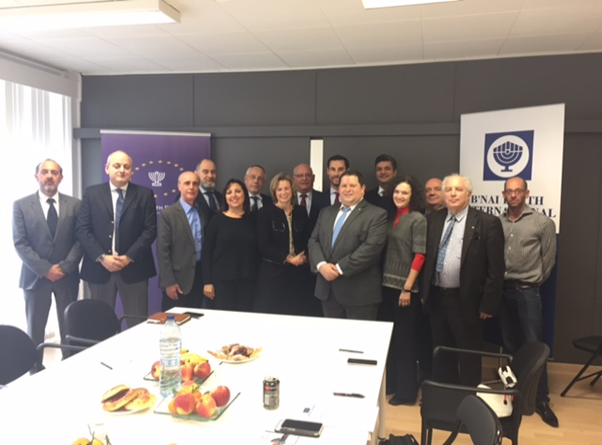
On Thursday, October 27th 2016, B’nai B’rith Europe hosted a roundtable with Katharina Von Shnurbein, coordinator on combating antisemitism for the European Commission.
In total 20 participants attended.
BBE Vice-President, Valerie Achache and Benjamin Naegele, BBI EU Affairs director, hosted the meeting, Stephane Teicher and Eric Engelmayer represented our BBE executive committee, and 11 European countries were represented by B’nai B’rith members.
In a warm atmosphere, Members of B’nai B’rith had the opportunity to meet and exchange ideas and views around lunch. Felicia Waldman (B’nai B’rith Romania) showed fellow BB members a short video about the last Bridges of Tolerance edition, in May 2016.
Valerie Achache kicked off the meeting by reading a message from Daniel Citone, BBE President, who could not attend the meeting due to sad circumstances.
In his message Daniel Citone expressed his gratitude to Katharina Von Shnurbein for meeting B’nai B’rith in their premises, and congratulated her for the thorough and serious work she does on antisemitism. Daniel also thanked all BB members who travelled to attend the meeting.
Then, each participant introduced themselves and their work. It was enlightening to hear B’nai B’rith members share their concerns, and how similar they were.
Mainly, the attendants’ concerns and questions touched upon the following:
· Left wing antisemitism, identified in BDS and anti-globalisation movements, and other “new” kinds of parties such as Podemos in Spain, and various anti-Zionist organisations
· The refusal of some governments as well as of the European Commission to acknowledge these tendencies to make the link between modern anti-Zionism and antisemitism, encouraging antisemitism
· Some governments’ tendency to put antisemitism and Muslim hatred on the same level, or only addressing antisemitism with the lens of Xenophobia at large
· Fears of ritual slaughtering and/or circumcision prohibition
· Online antisemitism
· European commission funds distributed to the PA
· The UNESCO recent decision ‘les liens entre la ville de Jerusalem et le people juif’
Katharina von Shnurbein, demonstrated by her comments and her answers how well, deeply and fairly she understood these matters and the particularities of each European Jewish community.
She explained her work and its difficulties. One of them is that some people ask whether antisemitism is still a problem nowadays, and whether Muslim hatred is not a more real concern. She attributes this to the fact that Jews are a much smaller and in a way less visible community.
Her team is financing a teaching programme on antisemitism, and they often team up with Israel. Programmes on antisemitism are being offered to the staff of the European Commission officials.
They organised together with the UN, the US and Canada the first UN conference on antisemitism in 2016. In 2017, they will have a conference on civil service and the role of the Holocaust.
On May 31st 2016, Katharina and her team, together with Facebook, Twitter, YouTube and Microsoft unveiled a code of conduct that includes a series of commitments to combat the spread of illegal hate speech online in Europe.
Katharina von Shnurbein explained that she had correspondents in each Member States, in Foreign ministries and she is meant to meet them very soon.
She highlighted that the fight against antisemitism is still very much a matter that is dealt with by Member States and that the European Commission has very little grip on it. As proof of this, the 2008 Council Framework Decision on combating racism and xenophobia has only been transposed by 13 Member States out of 27.
Katharina welcomed all the questions, comments and information that BB provided, and we felt that the number of European Jewish Communities that BBE represents is a great asset for her work.
The Commission is neutral regarding these matters, but this meeting left us with the impression that, on a personal level Katharina Von Shnurbein and her team are fully committed to helping the European Jewish Communities in fighting antisemitism.
In conclusion, this roundtable was a successful, rich and lively event. We are all hoping to be able to renew the experience and to address more specific topics next time.
